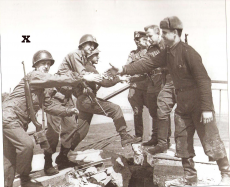
Finally, the post revisionist perspective of a secret colonial struggle must be considered in the emergence of the Cold War. As negotiations began to deteriorate in 1946 and the US saw Soviet movements as expansionist, US liaison in Moscow George Kennan sent a telegram advocating containment against increasing Soviet aggression and this ‘long telegram’ as it became known is widely considered to have marked the beginning of the Cold War. Indeed Isaacson and Thomas considered it ‘the most important cable in the history of the US foreign service’. Kennan’s policy of containment was supposedly a method of countering Soviet aggression, but with the benefit of hindsight we might conclude that in fact it marked the beginning of a cover for US colonialism. The US of course had to appear democratic and free and rather altruistic in the global theatre of international relations but in fact they contradicted these ideals on multiple occasions, supporting corrupt Governments in South Vietnam, Nicaragua and rebels in Afghanistan all in the interest of countering the USSR. Furthermore, in 1972 the US proved that they placed their own nation’s benefits over that of their ideals through the rapprochement with China, a nation who not only were Communist but were also infamously known to have breached human rights’ laws continuously, defying the US backed United Nations and all ideals of democracy and freedom. Mao’s China was effectively a dictatorship so in backing them against the USSR the United States proved that its real interests were emerging as victor in a battle of the superpowers. Indeed LaFeber notes that Mao had been the ‘Asian villain’ of the US since the 1950s but suddenly US President Nixon saw it in the US’ interests as a nation to play them off against the USSR. On this matter, even without Soviet sources, we can also critically assess Russian actions for they too seemed to place their national interests above that of their ideology. The USSR and China had signed a treaty of mutual agreement and friendship in 1950s after the People’s Republic of China was formed (PRC) yet through personal disagreements their negotiations deteriorated to the point that Russian and Chinese soldiers shot and killed one another over a small border conflict in 1969 at the Ussuri River by the Island of Damansk.The whole ideal of Marxist-Leninism is that it shall be a continuous global revolution and Communism will spread over the globe. The Communist nations would, if following ideology rather than personal imperial motives, adhere to this and ally for the common cause if it meant enough to them. Furthermore, in the late 1940’s Stalin refused to acknowledge Yugoslavia despite them being a Communist nation due to his dislike of the leader, Tito. All the above is to say that with the benefit of hindsight we can see that the US and USSR were both willing to defy their supposed ideology in order to pursue personal goals. We might logically conclude therefore that their real intentions were disguised colonialism and that in actual fact the Cold War originated from the clash of two superpowers intending to take advantage of a damaged post war world.
In light of the arguments expressed, it is clear that the origins of the Cold War can be difficult to identify, both for a lack of balanced sources and for the fact that ultimately scholars cannot prove the intentions of the superpowers in the years 1941-1991. Indeed the debate is still hotly contested today with multiple schools of thought and more considerations emerging annually. This being said, from our assessment of some possible origins of the Cold War we might logically conclude that the misunderstanding between Capitalist West and Communist East saw the escalation of tensions into conflict. Although the actions of individuals and potential imperial motives of both nations are no doubt important considerations, ultimately the perceptions of other nations’ actions most affected foreign policy and therefore contributed greatly to the outbreak of hostilities. Once the public began to gather behind propaganda and the opposing ideology became the enemy, from then onwards it was a path of no return for the opposing superpowers, who out of their pride and misunderstandings of one another were forced into 50 years of stale attrition, proxy wars, and the brink of atomic desolation.
IMAGE: http://www.daggersfromtheattic.com/sitebuildercontent/sitebuilderpictures/webassets/wwII.JPG

0 Comment:
Be the first one to comment on this article.